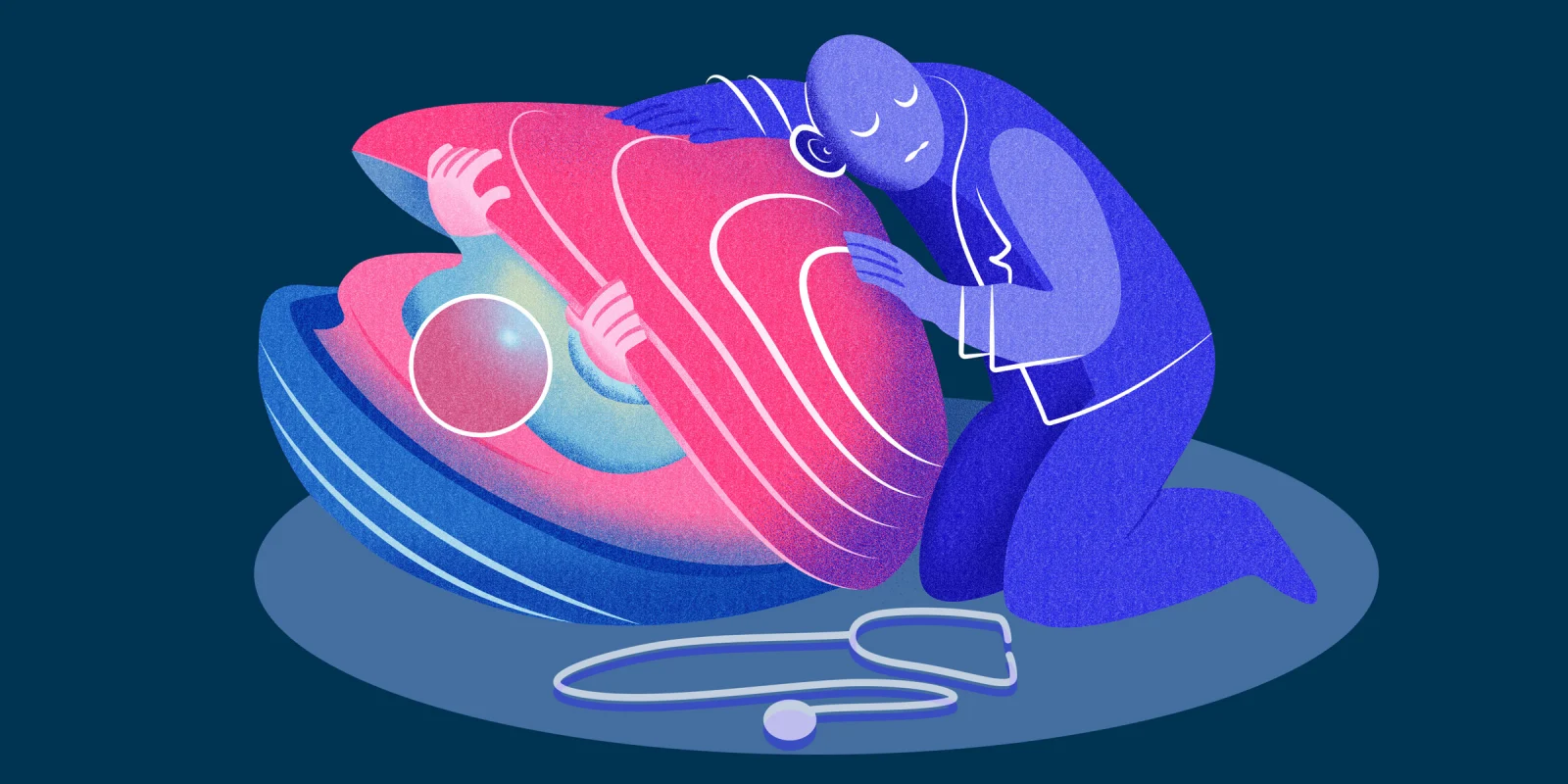I was close to the end of a long day at work. I’m a PA who works for a busy occupational medicine and urgent care center, and that day, I felt as if I had been dashing from room to room with barely enough time to breathe between appointments. I took my glasses off and rubbed my eyes. I had seen 40-plus patients since I had arrived at 8 a.m. and it was approaching 5 p.m. I checked the schedule. Two more patients, I thought to myself, I guess I can handle that. My thoughts turned to home and my comfortable chair, with my cantankerous but much-loved cat, Sister Grrl, who I knew had already claimed that space. It would feel good to get home and settle in for the night; I really needed my cup of tea and the comfort of sitting still for a while.
I glanced again at the clock. Not too long now. My medical assistant (MA) peeked around the corner to check on me and, recognizing my fatigue, quickly popped into the break room to grab a cold bottle of water. She put it on the desk in front of me. “You look like you could use this,” she said, giving my shoulder a pat before heading back to the reception desk where she had been deftly managing our busy patient scheduling, arrivals, billing, and phone calls. For the millionth time, I appreciated my competent and hard-working staff.
I scanned the schedule on my computer, perusing the remaining patients with a sigh; a follow-up work injury … should be quick, they were recovering and should be ready to close their claim very soon. Another STD check … really? I still don’t understand how in this time of rampant illness, when people are dying and sick in droves, there are still people taking chances with sexual encounters. I suppose spending almost two years with minimal contact and little company can make even the most stalwart germaphobe consider risking their health for some much-needed skin-to-skin contact. I suppose I shouldn’t judge, I have yet to meet an apple fritter that I don’t want to get to know better (though I do tend to keep my acquaintance with that sinful treat a casual and infrequent one). We all have our vices.
As anticipated, the last two patients were simple visits; I was in and out quickly. I glanced at the clock. Not bad, I thought. I’d have 30 minutes to complete my chart notes and prepare for the next day’s patients. I glanced a final time back at the schedule … What! I sighed. Another STD had been scheduled while I was in the last patient’s exam room. A surprise, and I hate surprises.
I barely had time to disguise my look of annoyance before my trusty MA peeked into the office again. “One more,” she said brightly. “We’ve already collected his co-pay and urine. He’s ready in Room 1.”
I smiled wanly at her as she disappeared around the corner to return to the reception desk. Great, I grumbled to myself, another person who expects me to fix the repercussions of their bad decisions.
But at this thought, I stopped myself. That was not who I wanted to be. I took a moment to adjust my attitude and remember the words my mother was fond of saying, “Make sure your words are tender and sweet, for tomorrow you may have to eat them.” I rolled my shoulders and cracked my neck. Heaving another sigh, I stood and proceeded to Room 1.
The patient was a young man. He was small in stature with delicate features and what seemed like huge, nervous eyes. I barely glanced up from his paperwork as I addressed him, in a voice louder than I had intended. “So what brings you in today?” I asked.
He answered in a bright anxious titter. “My car!”
I looked up wearily to meet his gaze. He was finely dressed with meticulous attention to detail, Burberry socks that matched a neatly tied Burberry scarf. He had quietly gleaming and stylish gold bangles that accompanied a simple but beautiful watch. He was dressed in sand-colored slacks with cuffs and a matching jacket that covered a chocolate-colored silk shirt with shining crimson buttons, tucked neatly into his trim and belted waist.
I shook off my annoyance and put his chart aside. Turning to address him directly I asked: “How are you doing this evening?” I studied him as his eyes darted nervously around the room. I could tell he was one of those people who is generally healthy and doesn’t often see medical professionals; it was clearly unnerving him.
“How can I help?” I asked, settling into my chair and smiling the most encouraging smile I could muster.
He took a deep breath. “I’m just here to see if I might have … gotten something from someone,” he said finally.
Fighting not to look at my watch, I leaned closer. “Why don’t we start at the beginning?” I asked. “Have you had any unprotected sexual encounters?”
He nodded, studying his shoes as if the answers to the universe were there.
“I can see you are kind of uncomfortable talking about things like this. I will try to help you to feel as comfortable as possible,” I said. “Everyone gets a little nervous in a medical office.”
He locked eyes with me and in a small voice said, “OK.”
I smiled, with genuine encouragement this time, and he uncrossed his arms and began picking nervously at his slacks. “This is a safe space,” I told him. “My time is yours while you are in this space. I want to help you and we can figure out together how to best do that.”
He let out the breath he had been holding.
I glanced back at his chart and, noting his name, addressed him using it. “Well, it’s nice to meet you, Alex. It sounds like you’re here to see if you’ve gotten any STIs, right?”
Alex nodded gratefully and I continued. “For starters, what are your pronouns?”
Sitting up brightly, he said, “Twinkle, Sparkle, and Shine.”
I chuckled lightly. “You have a great sense of humor,” I said, “but it seems like you’re using it to avoid this difficult discussion.” I relaxed against the back of my chair and waited quietly, studiously NOT looking at the clock.
“Them, they, theirs,” they said. Their voice sounded more confident.
“That’s great,” I said. “Have you ever had any STI testing in the past?”
They shook their head. “Oh no, I’m a very clean person, I’ve never had an STI before.”
I smiled. “STIs are not a sign of someone being dirty, just someone who didn’t use protection,” I said. “When I was small, my mother would insist that I wear my coat, hat, and scarf before going out in the rain to avoid getting a cold,” I told him. “If precautions aren’t taken, you can catch an illness. STIs are like any other illness that takes advantage of an opportunity to make us sick. My job is to figure out if you have an illness, treat it, and help you to use proper precautions — metaphorical coats, hats, and scarves — in the future.”
I looked up at them. They had a sarcastic expression on their face. Ignoring it, I continued on. “What’s going on with you, symptoms-wise?” I asked, preparing to scribble notes on their medical form. “Are you peeing a lot? Does it hurt to pee? Are there any sores, swelling, discharge?”
“I just don’t feel like myself,” they said, finally.
“Are you used to feeling healthy and now you don’t?” I asked.
“Well, not exactly,” they said.
I asked them about their usual partners, health and sexual habits, and overall health status. All of their answers were deflecting, mumbled, or elusive. I needed this patient to get to the point. I opened a drawer in the examination table and took out a gown. “Here you go,” I said, handing it to them. “Take everything off and put this on, open at the back. Knock on the door when you are ready.” I stepped outside. My MAs were busy with clinic cleanup and I could hear the vacuum running in the lobby. I looked at my watch: 10 after 6 o’clock!
Then I heard the knock. I gestured for my MA to join me, and we went into the exam room. They were sitting on the exam table with the gown on over their underwear.
What now? I thought.
“I’m sorry, you need to take everything off before you put the gown on,” I said, keeping my irritation from showing with Herculean effort.
“Can’t you just check me like this?” they asked.
My MA and I exchanged glances.
I sighed. “No, I can’t. The genitals are part of what we examine when you come in for an STI check.” I looked at them directly. “Are you sure you want to do this today?” I asked, hand on the doorknob.
In answer, they quickly reached under the gown and removed their underwear, throwing them onto the chair with their neatly folded clothes.
Finally, I thought to myself.
They were quiet for most of the exam, but when I tried to palpate their groin, to assess lymph node activity, they began giggling and squirming around on the table. Thus far, Alex had been adrift in the harbor of my patience — but storm clouds were gathering fast. My MA was trying unsuccessfully to hide a smile. “Look,” I said, “If you don’t want to do this, we can just stop, I don’t want you to feel uncomfortable and it seems that this is not a great time for you. I need you to sit still so I can do a proper exam. If you can’t do this, we can try at another time.” In my head I added: or in another clinic.
With my MA holding their hand, they were able to get through the exam, but not without constantly guarding their genitals from my view. “Are you in pain there?” I asked in frustration. “If there is pain, let me know, I don’t want to hurt you, but I have to get a look to make sure you are healthy.”
They assured me they were fine. “Just trying to be funny,” they said.
My patience was at an end. We played “genital hide-and-seek” for another five minutes until I finally gave up. Sighing heavily, I took my gloves off and threw them in the hazardous materials receptacle, more forcefully than I meant to.
“I guess that’s all we’re going to do here,” I said. We had succeeded in a brief, if barely adequate, exam, and my MA needed to collect blood, so I reached for the doorknob.
“Wait!” they called desperately.
I turned, hand still on the doorknob. “Yeah?” I snapped.
“You haven’t seen the bumps,” they said quietly, again studying the floor.
I stopped dead in my tracks. Why had it not occurred to me before? I asked my MA to leave the room and sat down gently in the chair. Feeling ashamed of myself for not getting it, I asked in a voice even softer than theirs, “Have you been sexually assaulted in the past?”
An enormous tear was sliding down their face, which was blushing now.
I couldn’t believe the role I had played in this patient’s already traumatic experience. I was one of those callous clinicians who made a bad situation worse with my selfish insistence on getting home in time. This patient was suffering … and I had almost completely missed everything. I simply had not seen them.
The story of their years of abuse as a child tumbled out of them like a broken dam. I sat quietly handing them tissues, and occasionally needing a tissue myself. I knelt in front of them. Their story told, they now sat trying to stem the torrent of emotions I had just released. “I’m so sorry,” I said, looking deeply into their red and swollen eyes. “I treated you badly just now and I deeply apologize. Let’s start over, yes?”
They put their hand in mine and said, “I think we’d better, me being in a gown and all …. ”
The rest of the exam was a snap. Much more comfortable now, they got tested and were out of the clinic in 15 minutes. It was now a quarter to 7 p.m. … and I didn’t care one bit.
Later that evening, as I sat in my chair with Sister Grrll purring at my feet, I was grateful that my patient had chosen to trust me, when I had given them every reason not to. And I was grateful that I had been able to figure out what was really going on with them. I wondered how many others had made the same mistake, adding to their trauma, not helping them at all.
Clinics and hospitals across our nation have been working on ways to increase access to medical care. As medical practitioners, we are supposed to be mindful about increasing our availability to a greater variety of patients. As a clinician who fits several categories of the “medically underserved,” I have a vested interest in bringing our efforts to fruition. Even the most accessible health care system will be ineffectual if our efforts end at the front desk. I have always considered myself a champion of the underserved and disenfranchised — after all, I was one of them. Who better than me to lead the charge to a brighter health care future?
But even I need reminders. What am I doing to continue the access behind the exam room door? Am I listening? Am I giving my patients space and time to communicate with me in a judgement-free environment?
It is tempting because of time constraints to guide patient conversations toward our treatment plans, with little regard for what may be best for any specific patient. It’s easier and more efficient to talk at the patients, instead of to them. But if we are not meeting the needs of our patients, can we really call it “efficiency”? If we consider meaningful dialogue between clinician and patient “wasted time,” it’s not them that need to be fixed — it’s us.
What steps do you take to make your exam room a safe environment for patients? Share your thoughts in the comments.
Arlene Dorrough is a practicing PA for the last 15+ years. She is currently working in occupational medicine and urgent care. She is also working as a Medical Examiner for the DOT. Arlene is a 2021–2022 Doximity Op-Med Fellow.
All names and identifying information have been modified to protect patient privacy.
Illustration by April Brust






